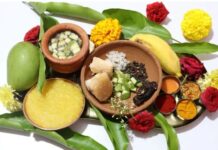
Bathukamma is a vibrant and significant floral festival celebrated predominantly in the Indian state of Telangana. The festival holds immense cultural and social importance in the region. Here’s an overview of the significance of Bathukamma:
- Cultural and Regional Identity: Bathukamma is an essential cultural symbol and a means of preserving and celebrating the unique identity of the Telangana region. It is a way for the people of Telangana to express their cultural pride and heritage.
- Celebration of Nature: The festival is a celebration of nature and the beauty of the Earth. Bathukamma, which means “Come Back to Life,” is a ritual where women create intricate flower arrangements using seasonal and indigenous flowers. These floral stacks are offered to the goddess Gauri, representing the life force and fertility of the Earth.
- Worship of the Goddess: Bathukamma is a form of worship to the goddess Gauri, who is believed to be the patron of womanhood, the symbol of eternal womanhood. Women and girls create Bathukamma, offer prayers, and seek the blessings of the goddess for a prosperous and healthy life.
- Community and Social Bonding: Bathukamma is a community festival where women and girls come together to participate in the preparation, rituals, and immersion of Bathukamma stacks. It fosters social bonding, strengthens relationships, and promotes unity within communities.
- Agricultural Significance: The festival has its roots in the agricultural practices of Telangana. Bathukamma is celebrated at the onset of Sharad Navaratri, which marks the beginning of the harvesting season. The festival is a way to give thanks for the bountiful crops and pray for a prosperous future.
- Cultural Heritage and Revival: Bathukamma has gained popularity in recent years, leading to the revival of Telangana’s unique culture, arts, and traditions. It serves as a platform for artists and performers to showcase their talent.
- Women’s Empowerment: Bathukamma empowers women and highlights their roles in the family and society. Women are the central figures in the preparation and celebration of the festival.
- Environmental Awareness: The use of local, seasonal flowers and natural materials in Bathukamma arrangements promotes environmental awareness and the sustainable use of resources.
Bathukamma is a festival that brings people together, promotes cultural heritage, celebrates nature, and showcases the rich traditions of Telangana. It has become an integral part of the social and cultural fabric of the region and is celebrated with great enthusiasm and fervor.
Bathukamma is a floral festival celebrated in the Indian state of Telangana, and it spans nine days. Each day of Bathukamma has its unique significance and rituals. The festival typically falls during the month of Ashwin, as per the Telugu calendar. Here is an overview of how each day of Bathukamma is celebrated:
1. Engili Pula Bathukamma (The First Day): The first day marks the beginning of the festival. Women and girls collect a variety of seasonal and indigenous flowers, mainly “Gunuka” flowers, and arrange them in concentric circular patterns.
2. Atla Bathukamma (The Second Day): On the second day, women prepare a special kind of dosa called “Atlu” and offer it to the goddess Gauri. These dosas are stacked in a pyramid-like structure.
3. Muddapappu Bathukamma (The Third Day): On this day, women prepare a special dish called “Muddapappu” and offer it as a prasadam to the goddess Gauri.
4. Nanabiyyam Bathukamma (The Fourth Day): Women cook rice and milk and offer it to the goddess in the form of a prasadam called “Nanabiyyam.” It represents the wish for a prosperous and nourishing life.
5. Atla Bathukamma (The Fifth Day): Similar to the second day, women prepare Atlu (dosa) and stack them in a pyramid to offer to the goddess.
6. Aligina Bathukamma (The Sixth Day): Women celebrate the beauty of nature on this day. They collect various flowers and herbs and decorate the Bathukamma with them.
7. Vepakayala Bathukamma (The Seventh Day): On this day, women arrange a special prasadam of neem leaves and sugarcane, representing the balance of bitterness and sweetness in life.
8. Vennamuddala Bathukamma (The Eighth Day): Women prepare a mixture of butter and sesame seeds and offer it to the goddess Gauri as a prasadam.
9. Saddula Bathukamma (The Ninth Day): The final day of Bathukamma is the grand celebration. Women immerse the Bathukamma in water bodies, such as lakes, rivers, or ponds, seeking the blessings of the goddess and praying for the prosperity of their families and the region.
Bathukamma is a festival that promotes cultural pride, celebrates the beauty of nature, and strengthens community bonds. The vibrant and colorful celebrations continue throughout the nine days, with women and girls coming together to create intricate floral arrangements and participate in various rituals.














